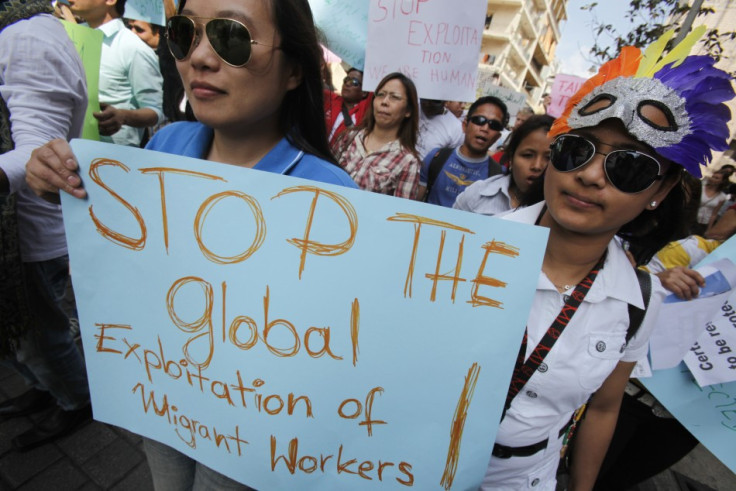Slavery Remembrance Day: UK Government abetting Modern Slavery with domestic worker inaction

It is fitting that today on the International Day of Remembrance for the Victims of Slavery and the Transatlantic Slave Trade, the Lords gather to discuss the Modern Slavery Bill. It is a proud moment for the British democracy and... oh, wait.
Unfortunately, instead of celebrating a big success that is the passing of the first comprehensive bill tackling modern slavery, we are here today wondering if the Parliamentarians stand alongside the government to become complicit in the slavery of migrant domestic workers.
Every year there are around 15,000 people, mostly women, arriving in the UK on the so-called Overseas Domestic Workers (ODW) visa. It is a special six-month visa for workers who arrive in Britain together with the employers for whom they worked prior to their arrival.
The vulnerability of domestic workers, who work in private households and aren't recognised as being regular workers entitled to regular workers' rights, is well documented. This vulnerability is increased for workers arriving from the Middle East countries, where the 'kafalah' sponsorship system tying the worker to their employer facilitates the abuse of workers on a large scale.
Imagine working 15 hours a day without a day off, not being able to go out as the door is locked from the outside when your employer leaves, not having a room to sleep in, being regularly shouted at, beaten or sexually assaulted. Seems improbable? Maybe. Yet the charity Kalayaan, working with domestic workers in London, reports women coming to them with such horrific stories of abuse, exploitation and slavery on a regular basis.
This is why, until recently, the ODW visa had the right to leave an abusive employer and seek another written into it. However, three years ago the Government removed this right, making domestic workers face a choice: stay with the abusive employer or leave and face deportation.
When the Modern Slavery Bill entered Parliament it had many flaws, mainly around the lack of measures protecting victims of slavery. The Government deserves credit for listening to the evidence from organisations working on this issue, and improving the Bill significantly.
However, on this most glaring issues it hasn't moved a jot. A joint campaign by a wide coalition of civil society organisations and domestic workers themselves failed to convince them.
Let's be clear about this: denying domestic workers the right to change employers - not even within the sector - defies both common sense and basic decency.
The Government's stipulation that a domestic worker can change employer only after receiving "conclusive grounds" from the National Referral Mechanism (NRM) that they have indeed been a victim of trafficking creates the situation where a person has to first prove to the Government that they are victims of a crime before being able to lawfully flee their abuser.
'On this crucial issue the government hasn't moved a jot. A joint campaign by a wide coalition of civil society organisations and domestic workers themselves failed to convince them.'
It overlooks the fact that it puts the worker at risk of reprisals if they are seen to engage with the authorities.
Although the Government insists that their amendment is necessary to increase the detection and conviction rates for employers enslaving vulnerable workers, of the 29 cases referred by the Kalayaan to the NRM which received "conclusive grounds" so far, only one has resulted in a conviction.
The Government has not only hitherto failed to investigate the enslavement of some of the most vulnerable women in the UK, it is now using this very failure as an excuse to prolong their servitude.

Furthermore, the research has shown the NRM to be a flawed system, with victims from outside of the European Union, who have no automatic right to work and stay in Britain and who make up the majority of overseas domestic workers, having a less than 20% chance of being recognised as victims of trafficking. There is, currently, no option of appealing a negative decision.
'You have to prove you have suffered a crime we probably won't recognise anyway'
Simply put, the Government essentially tells domestic workers: you might be a victim of horrendous abuse but before we decide to help you, you have to first prove to us that you are the victim of a crime that we're likely not to recognise anyway. We might not believe you because we think you might be doing this to abuse the visa system to settle in Britain permanently, in which case you will have to go back to your employer or be deported. You choose.
The peers have already stood up to the Government and voted for allowing domestic workers to change their abusive employers, but the Government overturned it in the Commons. Today the stakes are higher: the Parliamentary session ends this week for the election, so there is very little time. Any amendments made by the Lords need to be approved by the Commons.
A compromise amendment has been tabled: domestic workers can change employers but would have to notify the authorities about it. It addresses the Government's main argument that it wants to know about the abuse so the perpetrators can be caught.
This amendment, whilst not ideal in its detail, is still crucial. It will require some moral courage from both the Lords and the Commons to vote for it.
On a day when we remember all victims of slavery, migrant domestic workers in Britain face the stark reality of being pushed towards slavery by a government waving an anti-slavery flag. Today of all days is a good day to stand up and be counted.
Jakub Sobik works for Anti-Slavery International, the world's oldest human rights organisation. For more information visit www.antislavery.org or follow them on Twitter here.
© Copyright IBTimes 2025. All rights reserved.





















